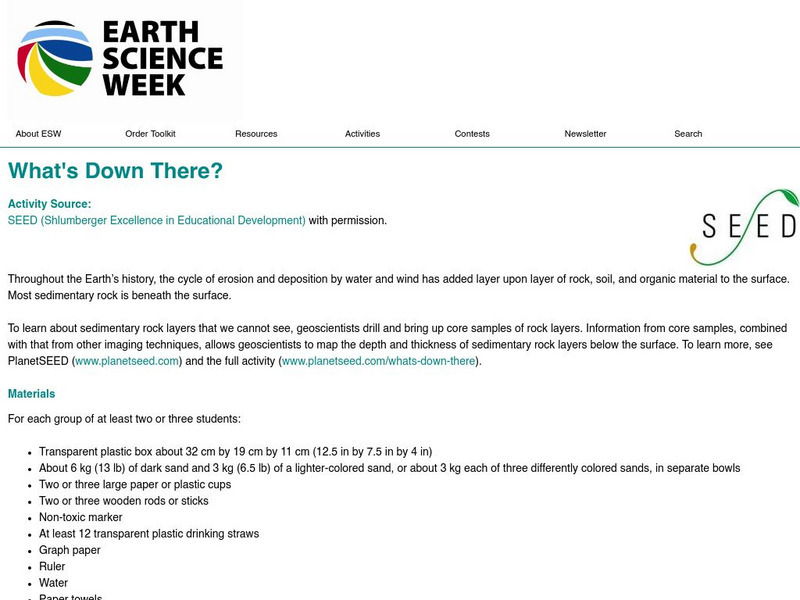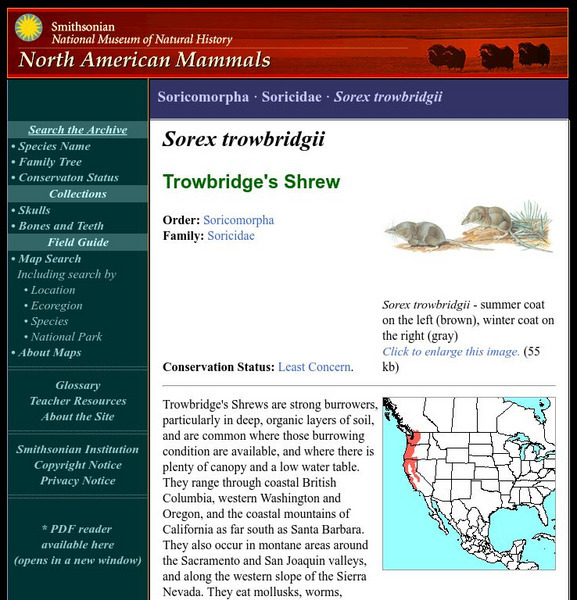Enchanted Learning
Enchanted Learning: Soil Layers
Wonderful visual chart showing the six layers of soil. Also includes brief descriptions of the 12 types of soil and soil formation. Worksheet for students to label the layers of the soil is also included.
Science Buddies
Science Buddies: Get Down and Dirty: How Does Soil Change With Depth?
What covers less than 10% of the Earth's surface, yet is a vital natural resource for terrestrial life? What filters ground water and supports most of our food production, not to mention the production of building materials and paper?...
University of Wisconsin
Geography 101: Soil Characteristics
By the end of this unit you should be able to: list the seven characteristics used to describe soils, to distinguish one soil from another soil, and to distinguish one soil layer from another soil layer; explain the impact of soil...
Utah Education Network
Uen: Investigation 6 Soil Profile
In this hands-on lesson, students investigate the properties of different layers of soil.
ClassFlow
Class Flow: Soil
[Free Registration/Login Required] This flipchart contains a pre-test using the Activotes. It is a third grade study of the three main types of soil as well as the layers of soil. Graphic organizers and hands-on experiments are integrated.
Utah State Office of Education
Utah Science: Rocks, Minerals, and Soils Introduction
Dig into the layers of activities exploring and investigating minerals and how they are related to both rocks and soil.
Alabama Learning Exchange
Alex: Digging in for Dirt Day!
This activity is managed through stations that students will rotate around every 20- 30 minutes. Each second grade teacher conducts one station. Parent volunteers can also be used to manage stations. Students will use an auger to gather...
Ducksters
Ducksters: Earth Science for Kids: Soil
Kids learn about the Earth science subject of soil including how it is formed, properties, horizons, layers, topsoil, bedrock, and facts about soil.
Utah Education Network
Uen: Sand, Clay and Humus
Fourth graders study the differences between humus, sand, and clay soil.
Colonial Williamsburg Foundation
The Colonial Williamsburg Foundation: Dirt Detective
Archaeologists study artifacts and soil and they use post holes to determine just how old the layers of soil is. Based on the location of post holes, archaeologists can determine if they are finding a house, or a wall or even a fort....
TeachEngineering
Teach Engineering: Shallow & Deep Foundations
Students investigate the critical nature of foundations as they learn differences between shallow and deep foundations, including the concepts of bearing pressure and settlement. Using models representing a shallow foundation and a deep...
Environmental Education for Kids
Eek!: Art and Crafts: Edible Aquifer
Groundwater is stored in and moves slowly through layers of soil, sand and rocks called aquifers. To help you visualize groundwater, you will make an aquifer, in this case, an edible one. This will show you how groundwater is stored and...
Utah Education Network
Uen: Nhmu: Our Ancient Earth the Stratigraphy Cup
Activity provides students an opportunity to make a stratigraphy cup.
American Geosciences Institute
American Geosciences Institute: Earth Science Week: What's Down There?
Students build a model to learn about the cycle of erosion and deposition by water and wind which deposits layer upon layer of rock, soil, and organic material to the surface.
Smithsonian Institution
National Museum of Natural History: American Mammals: Trowbridge's Shrew
Trowbridge's Shrews are strong burrowers, particularly in deep, organic layers of soil, and are common where those burrowing condition are available, and where there is plenty of canopy and a low water table. They range through coastal...
Other
Planet Ark: World Environmental News
Welcome to Planet Ark's daily Reuters World Environment News - the most comprehensive source of environmental news on the Net. To read previous news stories, please use the search engine below to find stories relating to any...
BiologyWise
Biology Wise: Structure and Function of a Casparian Strip
The Casparian strip is found in the endodermis layer of a plant's roots and it assists the plant in absorbing water and nutrients from the soil. The structure of a plant root is described and the process by which the Casparian strip...
Smithsonian Institution
Smithsonian Education: Decoding the Past
The Smithsonian offers students a background on what archaeology is and what an archaeologist does. Several lesson plans are also provided.
Curated OER
Educational Technology Clearinghouse: Maps Etc: North China, 1971
" North China includes the densely populated and intensively cultivated North China Plain, the loess-covered uplands of Shansi, northern Shensi, and eastern Kansu, and the sparsely populated, semiarid steppes of Inner Mongolia....
Other popular searches
- Soil Layers
- Soil Layers Diagram
- Soil Layers Activity
- Elementary Soil Layers
- Three Layers of Soil
- Earth Soil Layers
- Soil Layers Grade 7
- Layers of Soil Quiz
- Four Layers of Soil
- Jello Soil Layers
- Soil Layers Demo
- Soil Layers and Properties














